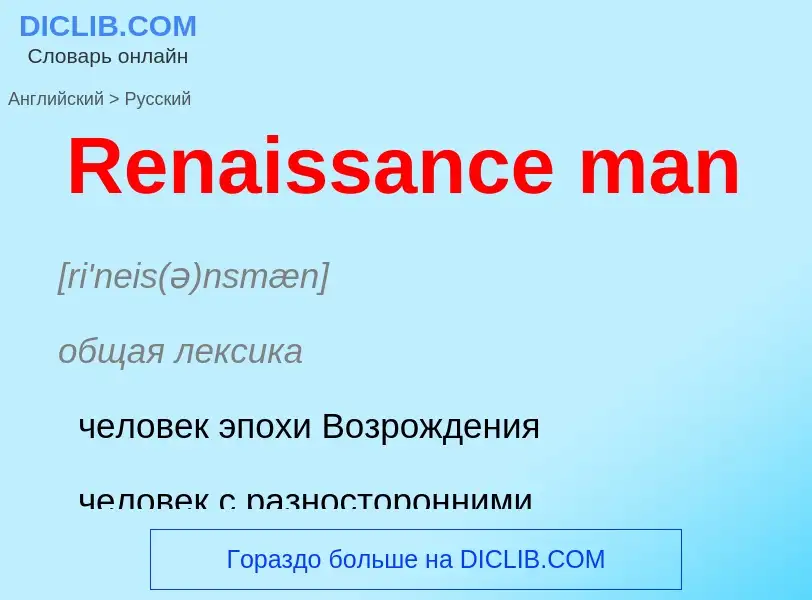Traducción y análisis de palabras por inteligencia artificial ChatGPT
En esta página puede obtener un análisis detallado de una palabra o frase, producido utilizando la mejor tecnología de inteligencia artificial hasta la fecha:
- cómo se usa la palabra
- frecuencia de uso
- se utiliza con más frecuencia en el habla oral o escrita
- opciones de traducción
- ejemplos de uso (varias frases con traducción)
- etimología
Renaissance man - traducción al ruso
[ri'neis(ə)nsmæn]
общая лексика
человек эпохи Возрождения
человек с разносторонними
часто поверхностными интересами
[pə'liməθi]
существительное
книжное выражение
эрудированность
энциклопедичность
[pɔli|'histə-{pɔli}hi'stɔ:riən]
существительное
книжное выражение
эрудит
Definición
Wikipedia

A polymath (Greek: πολυμαθής, romanized: polymathēs, lit. 'having learned much'; Latin: homo universalis, lit. 'universal human') is an individual whose knowledge spans a substantial number of subjects, known to draw on complex bodies of knowledge to solve specific problems.
In Western Europe, the first work to use the term polymathy in its title (De Polymathia tractatio: integri operis de studiis veterum) was published in 1603 by Johann von Wowern, a Hamburg philosopher. Von Wowern defined polymathy as "knowledge of various matters, drawn from all kinds of studies ... ranging freely through all the fields of the disciplines, as far as the human mind, with unwearied industry, is able to pursue them". Von Wowern lists erudition, literature, philology, philomathy, and polyhistory as synonyms.
The earliest recorded use of the term in the English language is from 1624, in the second edition of The Anatomy of Melancholy by Robert Burton; the form polymathist is slightly older, first appearing in the Diatribae upon the first part of the late History of Tithes of Richard Montagu in 1621. Use in English of the similar term polyhistor dates from the late 16th century.
Polymaths include the great scholars and thinkers of the Renaissance and Enlightenment, who excelled at several fields in science, technology, engineering, mathematics, and the arts. In the Italian Renaissance, the idea of the polymath was allegedly expressed by Leon Battista Alberti (1404–1472), a polymath himself, in the statement that "a man can do all things if he will". Gottfried Wilhelm Leibniz has often been seen as a polymath. Al-Biruni was also a polymath. Leonardo da Vinci, Ibn al-Haytham, Rabindranath Tagore, Mikhail Lomonosov, Benjamin Franklin, John von Neumann, Charles Sanders Peirce and Thomas Jefferson are other well known and celebrated polymaths.
Embodying a basic tenet of Renaissance humanism that humans are limitless in their capacity for development, the concept led to the notion that people should embrace all knowledge and develop their capacities as fully as possible. This is expressed in the term Renaissance man, often applied to the gifted people of that age who sought to develop their abilities in all areas of accomplishment: intellectual, artistic, social, physical, and spiritual.

![[[Benjamin Franklin]] is one of the foremost polymaths in history. Franklin was a writer, scientist, inventor, statesman, diplomat, printer and political philosopher. He was one of the [[Founding Fathers of the United States]]. [[Benjamin Franklin]] is one of the foremost polymaths in history. Franklin was a writer, scientist, inventor, statesman, diplomat, printer and political philosopher. He was one of the [[Founding Fathers of the United States]].](https://commons.wikimedia.org/wiki/Special:FilePath/Benjamin Franklin 1767.jpg?width=200)

